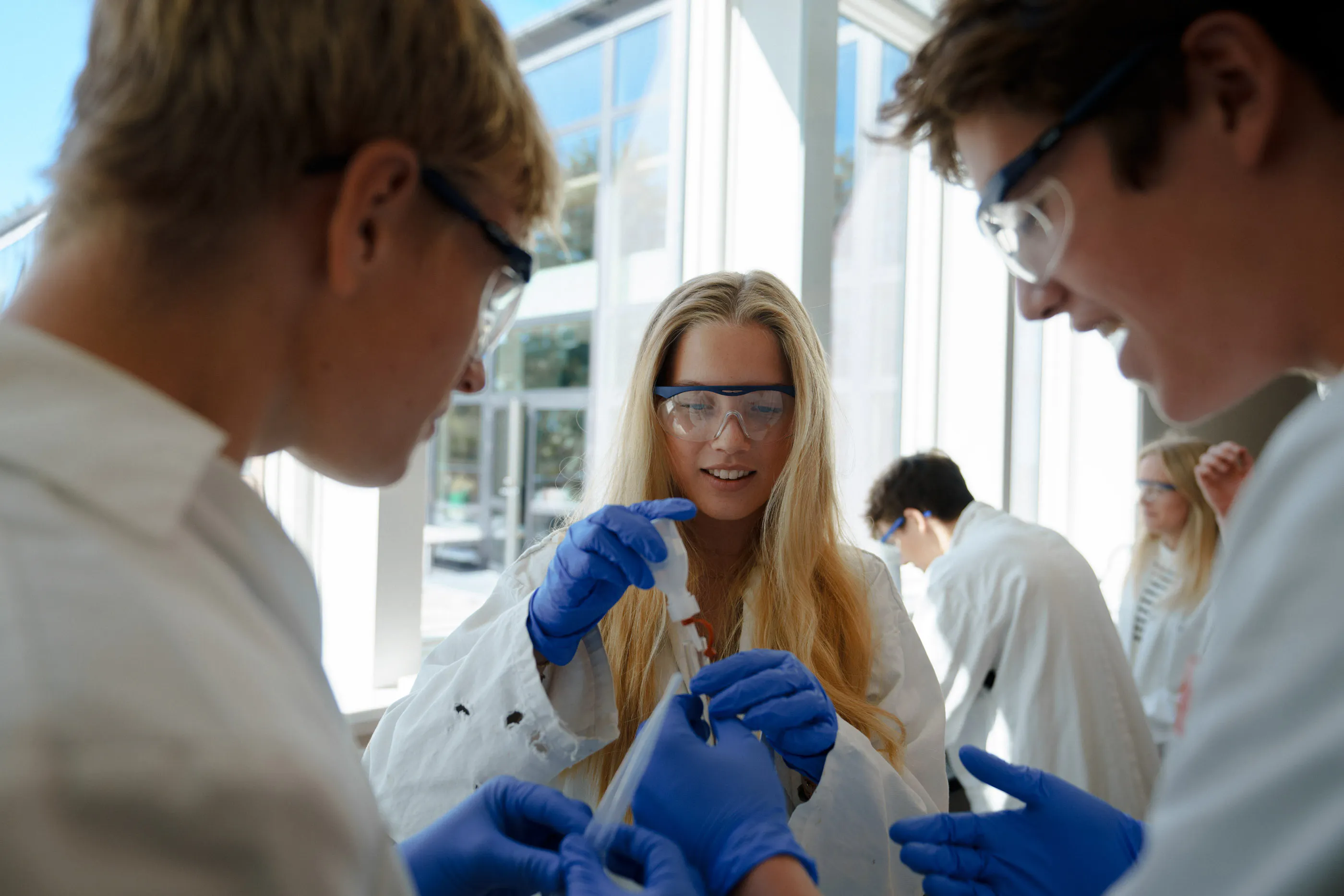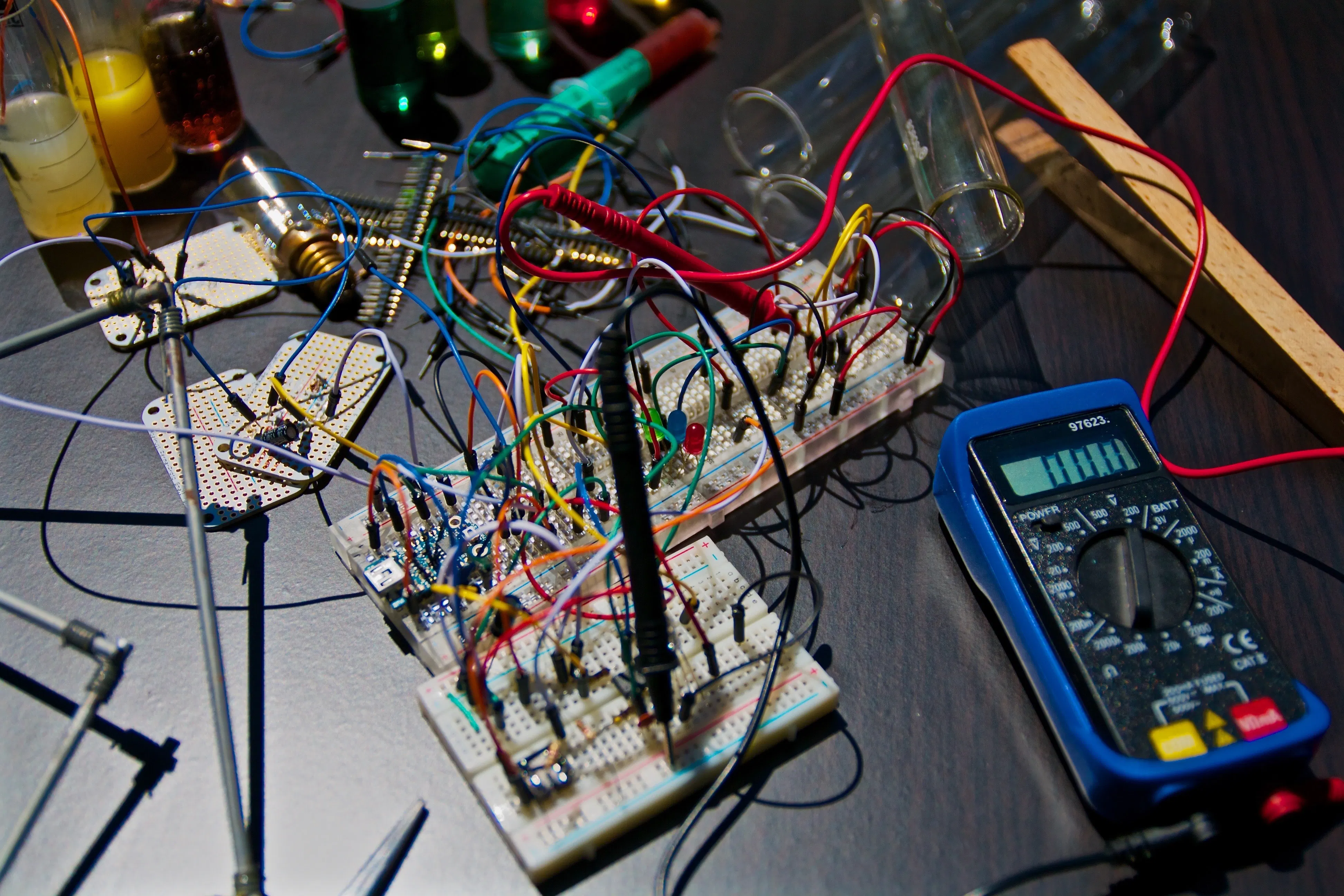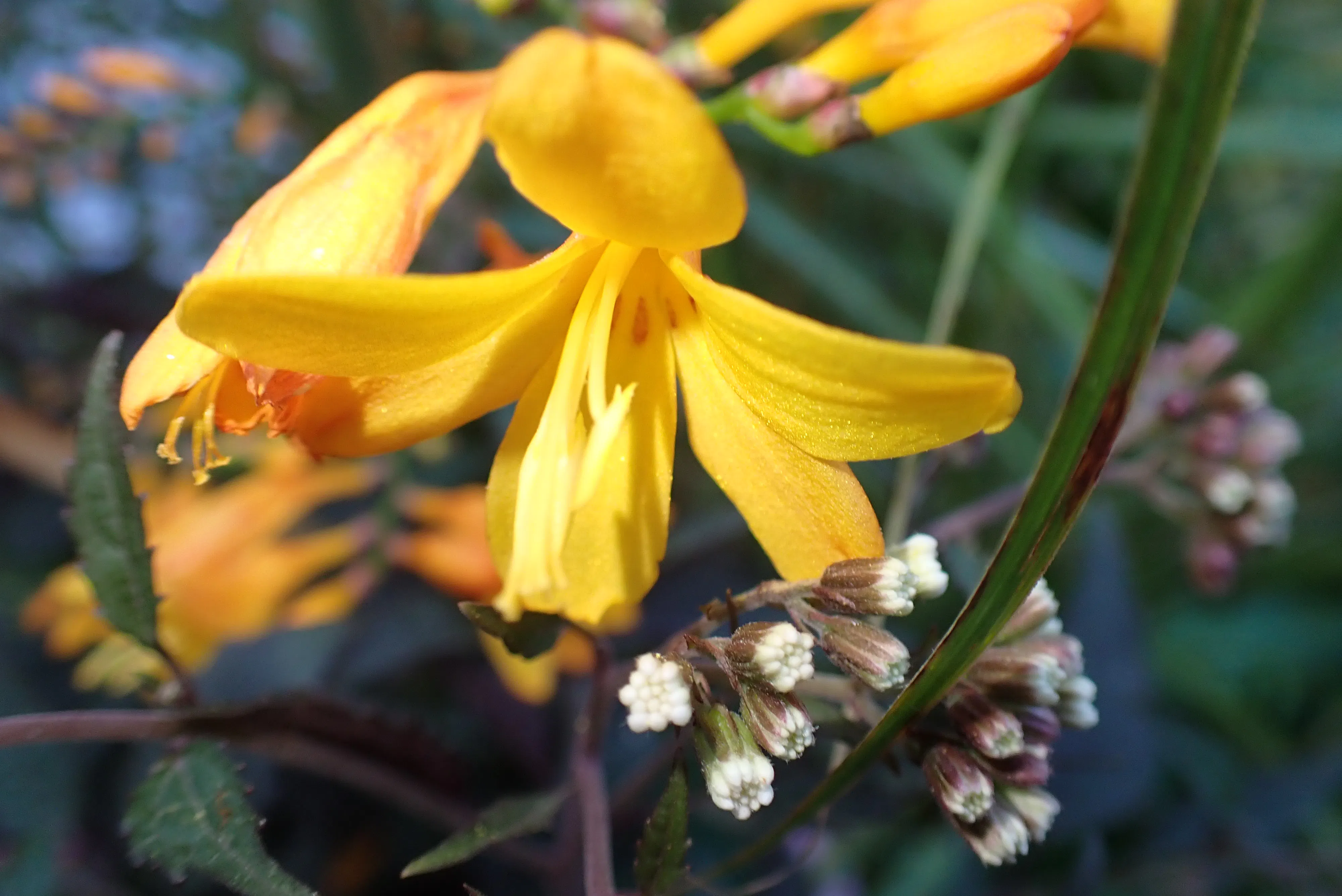
NB. Dette indhold er kun tilgængeligt på engelsk
Group 4: The Sciences
Group 4 subjects contain Physics, Chemistry, Biology, and Environmental Systems & Societies. All subjects are described below.

Physics
Physics (SL/HL)
Physics is an experimental science, and experiments performed by the students – usually with electronic data logging and sophisticated data processing – play a crucial role throughout the two years. Halfway through the course, the students perform an individual investigation of an experimental problem, the report of which will count with 20 % towards the final grade in physics.
The theory is structured into core topics (common to both higher level and standard level), additional higher level topics, and an optional topic. Core topics include mechanics, thermal physics, oscillations and waves, electricity and magnetism, atomic, nuclear, and particle physics, as well as energy production. In addition to this, HL is taught gravitational, electric, and magnetic fields, induction, and elementary quantum physics. Finally, both SL and HL choose one among four optional topics: theory of relativity, engineering physics, imaging, and astrophysics.
For the successful study of Physics in the IB Diploma Programme, a strong foundation and fluency in mathematics are essential. We, therefore, recommend choosing the course Mathematics Analysis and Approaches, and preferably (although not necessarily) at Higher Level.
Physics is a popular subject for the Extended Essay, which gives the student the opportunity to perform more advanced experimental investigations under the supervision of a teacher.
Exam
The written test (3 hours for SL and 4½ hours for HL) has three parts:
Paper 1 and paper 2 both test the core (multiple choice and extended questions, respectively).
Paper 3 consists of questions related to experimental work and data processing, as well as questions in the option studied.
For both levels, the written exam counts 80% of the final mark, while the remaining 20% comes from the internally assessed and externally moderated experimental investigation.

Chemistry
Chemistry (SL/HL)
Chemistry is all around you, and within you. Our everyday lives are influenced, controlled and driven by chemistry from the biochemical processes within cells, to fuels, medicines, foodstuffs, dyes, paints, forensics, medical analysis (such as MRI scanners), radiotherapy, polymers and plastics, nanotechnology, liquid crystals and materials (such as iron and steel). The practical importance of chemistry is huge and the study of this science is enjoyable as a subject in its own right, but it is also often required as a preparation for higher education courses such as medicine and other science subjects. We strongly recommend HL for application to medicine in the UK.
Standard level (SL) and higher level (HL) Chemistry both follow a common compulsory core of study in the following topics: Stoichiometric relationships, Atomic structure, Periodicity, Chemical bonding and structure, Energetics/thermochemistry, Chemical kinetics, Equilibrium, Acids and bases, Oxidation and reduction, Organic chemistry, and Measurement and data processing.
HL students then study additional material (AHL) which develops the above topics in greater depth, detail and to a greater level of abstraction. Higher level chemistry is more intellectually challenging than standard level, since more complete explanations are studied, for example, hybridization and the formation of molecular orbitals for bonding. Both SL and HL students study one of four option topics - again with the HL students encountering greater depth, abstraction and volume of material. While the possible options are Materials, Biochemistry, Energy and Medicinal chemistry, the option studied by the class is chosen by the teacher to fit the needs of the particular class.
Mathematics is central to many aspects of chemistry, and so a strong foundation in mathematics is recommended.
Experimental work
Chemistry is an experimental science and practical work is an integral part of the course. SL/HL students are required to perform 40/60 hours of experimental work over the 2 years. The Group 4 project (10 hours) and the individual investigation (10 hours) are mandatory parts of the experimental work. The experimental work is assessed externally as well as internally. The internally assessed individual investigation contributes 20% to the final IB grade in chemistry.
Exam
The format of the 3 papers is basically the same for both levels except that the AHL topics are covered on Papers 1 and 2 of the HL exam in addition to the core material.
Paper 1 is a multiple choice paper on the core material. (SL 3/4 hours / HL 1 hour)
Paper 2 has short-answer and extended-response questions on the core material.
(SL 1¼ hours / HL 2¼ hours)
Paper 3 has two sections (SL 1 hour / HL 1¼ hours):
Section A has one data-based question and several short-answer questions on experimental work.
Section B has short-answer and extended-response questions from the chosen option.

Biology
Biology (SL/HL)
Biology is the science of all living organisms taken from the molecular level to the level of the global biosphere. In IB biology we follow a Syllabus that contains all of the major fields of work within the frame of the science “Biology”. Find listed below our list of core topics:
Topic 1: Cell biology (15 hours)
Topic 2: Molecular biology (21 hours)
Topic 3: Genetics (15 hours)
Topic 4: Ecology (12 hours)
Topic 5: Evolution and biodiversity (12 hours)
Topic 6: Human physiology (20 hours)
The biology course is divided into a standard level course and a higher level course and as such our Syllabus also contains the following additional higher level topics:
Topic 7: Nucleic acids (9 hours)
Topic 8: Metabolism, cell respiration and photosynthesis (14 hours)
Topic 9: Plant biology (13 hours)
Topic 10: Genetics and evolution (8 hours)
Topic 11: Animal physiology (16 hours)
Additionally, we have to study one of the following options at either standard (15 hours) or higher level (25 hours):
Option A: Neurobiology and behavior
Option B: Biotechnology and bioinformatics
Option C: Ecology and conservation
Option D: Human physiology
Experimental work
Seeing that biology is an experimental science the course also contains an important experimental dimension. At standard level the PSOW (practical scheme of work) has a duration of 40 hours and at higher level it is covered in the time span of 60 hours. The experiments are mainly carried out in our school laboratories but we also visit facilities for instance at the Copenhagen University. The Group 4 project (10 hours) and the individual investigation (10 hours) are mandatory parts of the experimental work. The experimental work is assessed externally as well as internally. The internal assessment (IA) has the form of a self-designed experiment that is submitted as a 12 pages report containing the exploration, data analysis and evaluation of the experiment.
Exam
Examinations in Biology contains three written papers that contains multiple-choice questions, factual recall questions and prolonged answers questions. These papers make up 80% of the final grade and the internal assessment covers the remaining 20%.
For further information concerning the BG way of teaching the IB biology Syllabus, please contact head of IB biology at BG Christina Høier Ricke on e-mail: cr@birke-gym.dk

Environmental systems and societies
Environmental systems and societies (SL/HL)
ESS is an interdisciplinary course that introduces you to some big environmental issues facing humans and the world that we inhabit. It is firmly grounded in both a scientific exploration of environmental systems in their structure and function and in the exploration of cultural, economic, ethical, political, and social interactions of societies with the environment. Therefore, the course requires you to perform research and investigations and to participate in philosophical discussion.
As a result of studying this course, you will become equipped with the ability to recognize and evaluate the impact of our complex system of societies on the natural world. The systems approach to environmental understanding and problem solving will promote a holistic thinking about environmental issues.
ESS is an interdisciplinary group 3 and 4 course that is offered. At BG the course is offered as a group 4 course.
Core content
Topic 1— Foundations of environmental systems and societies
Topic 2—Ecosystems and ecology
Topic 3—Biodiversity and conservation
Topic 4—Water and aquatic food production systems and societies
Topic 5—Soil systems and terrestrial food production systems and societies
Topic 6—Atmospheric systems and societies
Topic 7—Climate change and energy production
Topic 8—Human systems and resource use
Practical work
Practical activities in the course includes laboratory exercises, fieldwork, questionnaires, as well as database research.
An individual investigation is a mandatory part of the Internal Assessment and constitutes 25% of the final grade.
Exam
Paper 1 is short answer questions based on a case study booklet (1 hour, 25% of the final grade).
Paper 2 has two parts. Section A is short answer questions covering core material and Section B is two essays from a choice of four (2 hours, 50% of the final grade).